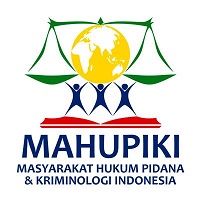ETIKA MORAL DAN INTEGRITAS TERSELENGGARANYA SISTIM DEMOKRASI PEMILIHAN LANGSUNG KEPALA DAERAH 2024 SESUAI NILAI YANG TERKANDUNG DALAM PANCASILA
Keywords:
Ethics, Morals, Political Integrity, Pancasila DemocracyAbstract
Democracy is a main pillar in the Indonesian government system which is based on the 1945 Constitution and adopts a presidential system with direct elections every five years. General Elections (Pileg and Pilpres) and Regional Head Elections (Pilkada) are part of the Pancasila Democracy system which emphasizes ethics and morals in the nation and state. Pilkada as a form of democracy provides constitutional rights for citizens to elect regional leaders who are considered worthy. This direct election strengthens the democratic system with the principles of direct, general, free, and secret (Luber), but faces major challenges, including the potential for disputes in court. This study uses a normative research method with a statutory regulatory approach and case studies on the implementation of democracy in the 2024 Pilkada. The legal basis used includes Law No. 10 of 2016 concerning Pilkada and Law No. 7 of 2017 concerning Elections, which are a follow-up to the Constitutional Court Decision No. 14 of 2013. The results of this study indicate that there is a close relationship between the values of Pancasila and democracy in the 2024 Pilkada, especially in the aspects of justice, equal rights, and political participation based on national ethics and morals. However, the implementation of Pancasila values in the democratic process still faces challenges, such as money politics, hoaxes, and political polarization that can erode the integrity of the election. Therefore, it is necessary to strengthen ethics and morals in the 2024 Pilkada through political education, strict law enforcement, and optimization of the role of election organizers and supervisors.
References
Anwar Alaydrus, Jamal, Niken Nurmiyati, dan M. I. P. S. Pengawasan Pemilu: Membangun Integritas, Menjaga Demokrasi. Penerbit Adab, 2023.
Azis Setyagama. Hakikat dan Makna Pilkada Langsung di Indonesia. Jakarta: Jakad Media Publishing, 2017.
Darmawan Harefa dan M. M. Fatolosa Hulu. Demokrasi Pancasila di Era Kemajemukan. PM Publisher, 2020.
Geofani Milthree Saragih. "Pancasila sebagai Landasan Filosofis Pembentukan Peraturan Perundang-Undangan di Indonesia." Jurnal Pancasila dan Kewarganegaraan (JUPANK) 2, no. 1 (2022).
Hariman Satria. "Politik Hukum Tindak Pidana Politik Uang dalam Pemilihan Umum di Indonesia." Integritas: Jurnal Antikorupsi 5, no. 1 (2019).
Marulak Pardede. "Legitimasi Pemilihan Kepala/Wakil Kepala Daerah dalam Sistem Pemerintahan Otonomi Daerah." Jurnal Penelitian Hukum (2018).
Mohammad Anas. "Menyemai Nalar Kebhinnekaan dalam Mewujudkan Pendidikan Multikultural." Jurnal Ilmiah Pendidikan Pancasila dan Kewarganegaraan 4, no. 1 (2019).
Suyatno. "Pemilihan Kepala Daerah (Pilkada) dan Tantangan Demokrasi Lokal di Indonesia." Politik Indonesia: Indonesian Political Science Review 1, no. 2 (2016).
Wimmy Haliim. "Demokrasi Deliberatif Indonesia: Konsep Partisipasi Masyarakat dalam Membentuk Demokrasi dan Hukum yang Responsif." Masyarakat Indonesia 42, no. 1 (2016).
Wimmy Haliim. Bangkitlah Pancasila!!: Sebuah Gagasan Kehidupan Berbangsa dan Bernegara. Malang: Universitas Brawijaya Press, 2014.
Undang-Undang Dasar Negara Republik Indonesia Tahun 1945
Undang-undang (UU) Nomor 7 Tahun 2017 tentang Pemilihan Umum
Undang-undang (UU) Nomor 10 Tahun 2016 tentang Perubahan Kedua Atas Undang-Undang Nomor 1 Tahun 2015 Tentang Penetapan Peraturan Pemerintah Pengganti Undang-Undang Nomor 1 Tahun 2014 Tentang Pemilihan Gubernur, Bupati, Dan Walikota Menjadi Undang-Undang
Downloads
Published
How to Cite
Issue
Section
License
Copyright (c) 2024 Maniur Sinaga

This work is licensed under a Creative Commons Attribution 4.0 International License.










